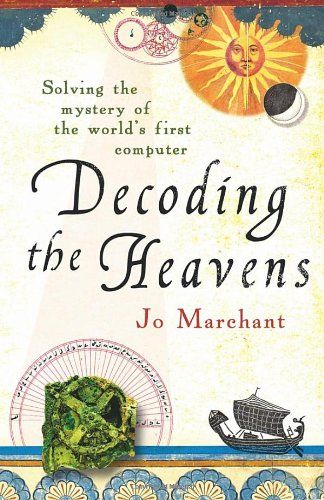Decoding the Heavens: Solving The Mystery Of The World's First Computer
The bronze fragments of an ancient Greek device have puzzled scholars for more than a century after they were recovered from the bottom of the Mediterranean Sea, where they had lain since about 80 BC. Now, using advanced imaging technology, scientists have solved the mystery of its intricate workings. Unmatched in complexity for a thousand years, the mechanism functioned as the world's first analog computer, calculating the movements of the sun, moon, and planets through the zodiac.
In Decoding the Heavens, Jo Marchant details for the first time the hundred-year quest to decode this ancient computer. Along the way she unearths a diverse cast of remarkable characters--ranging from Archimedes to Jacques Cousteau--and explores the deep roots of modern technology, not only in ancient Greece, but in the Islamic world and medieval Europe. At its heart, this is an epic adventure story, a book that challenges our assumptions about technology development through the ages while giving us fresh insights into history itself.
In 1900 a group of sponge divers blown off course in the Mediterranean discovered an Ancient Greek shipwreck dating from around 70 BC. Lying unnoticed for months amongst their hard-won haul was what appeared to be a formless lump of corroded rock, which turned out to be the most stunning scientific artefact we have from antiquity. For more than a century this 'Antikythera mechanism' puzzled academics, but now, more than 2000 years after the device was lost at sea, scientists have pieced together its intricate workings. Unmatched in complexity for 1000 years, it was able to predict eclipses and track the paths of the Sun and the Moon through the zodiac, and probably even showed ancient astronomers the movements of the five known planets.
In Decoding the Heavens, Jo Marchant tells for the first time the story of the 100-year quest to understand this ancient computer. Along the way she unearths a diverse cast of remarkable characters - ranging from Archimedes to Jacques Cousteau - and explores the deep roots of modern technology not only in ancient Greece but in the Islamic world and medieval Europe too.At heart an epic adventure story, it is a book that challenges our assumptions about technology transfer over the ages while giving us fresh insights into history itself.
| Author | Jo Marchant |
|---|---|
| Publisher | William Heinemann |
| Place | London |
| Year | 2008 |
| ISBN | 9780434018352 |
| Binding | Hardcover |
| Condition | Good |
| Comments | Yellowed pages. |
How we describe the condition of our books
We are very proud of the condition of the books we sell (please read our testimonials to find out more!)
New: Exactly as it says.
As New: Pretty much new but shows small signs of having been read; inside it will be clean without any inscriptions or stamps; might contain a remainder mark.
Very Good: Might have some creases on the spine; no hard cracks; maybe slight forward lean and short inscription inside; perhaps very minor bumping on the corners of the book; inside clean but the page edges might be slightly yellowed.
Good: A few creases on the spine, perhaps a forward lean, bumping on corners or shelfwear; maybe an inscription inside or some shelfwear or a small tear or two on the dustjacket; inside clean but page edges might be somewhat yellowed.
Fair: In overall good condition, might have a severe forward lean to the spine, an inscription, bumping to corners; one or two folds on the covers and yellowed pages; in exceptional cases these books might contain some library stamps and stickers or have neat sticky tape which was used to fix a short, closed tear.
Poor: We rarely sell poor condition books, unless the books are in demand and difficult to find in a better condition. Poor condition books are still perfect for a good read, all pages will be intact and none threatening to fall out; most probably a reading copy only.


